Brazil has some of the worst COVID statistics in the entire world, with the total number of cases and deaths far exceeding those of many other countries. The health system can’t keep up as young people and even babies are dying from the disease.
The city of São Paulo had 13 hospitals with intensive care unit (ICU) beds filled with patients from Covid-19. Altogether, there were 9 state hospitals and 4 municipal hospitals with 100% capacity.
The Mobile Emergency Care Service (SAMU 192) is a Brazilian pre-hospital emergency care service, used in urgent and emergency cases. It was conceived in France in 1986 as an urgent Service d’aide médicale – which uses the same acronym “SAMU” – and is considered by specialists as the best in the world.
The 37 municipalities that make up the São Paulo Metropolitan Region held 23.6% of the Brazilian population, that is, 49 million inhabitants, according to a study released by IBGE (Brazilian Institute of Geography and Statistics) in 2018. During the COVID 19 crisis, the service has been essential for the rescue of people who are victims of the virus while still maintaining the care service for patients from all other areas. The service mainly serves the poorest part of the population.

A 32-year-old man being treated after he tried to take his life. The man was taken to a health center in the southern region of the city of São Paulo, trained to attend surgical and psychiatric cases. The center was fully booked due to the large number of patients infected with COVID, but can be seen after more than 2 hours waiting. The city of São Paulo had 13 hospitals with intensive care unit (ICU) beds filled with patients from Covid-19 this Wednesday morning (10). Altogether, there were 9 state hospitals and 4 municipal hospitals with 100% capacity. This Wednesday 10/04/2021 Brazil surpassed the mark of 2 thousand deaths by Covid-19 registered in 24 hours: 2,349 lives lost. The Mobile Emergency Care Service (SAMU 192) is a Brazilian pre-hospital emergency care service, used in urgent and emergency cases. It was conceived in France in 1986 as an urgent Service d'aide médicale - which uses the same acronym "SAMU" - and is considered by specialists as the best in the world. The 37 municipalities that make up the São Paulo Metropolitan Region held 23.6% of the Brazilian population, that is, 49 million inhabitants, according to a study released by IBGE (Brazilian Institute of Geography and Statistics) in 2018. During the COVID 19 crisis, the service has been essential for the rescue of people who are victims of the virus while still maintaining the care service for patients from all other areas. The service mainly serves the poorest part of the population.
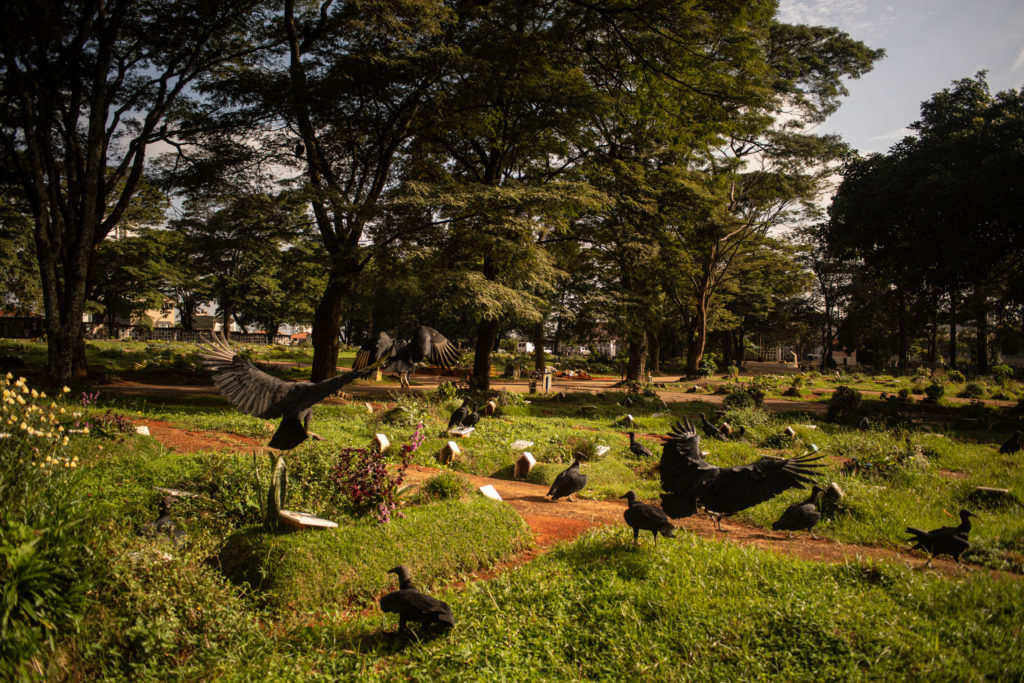
On 03/26/2021, Brazil again broke the mark of its worst day of the pandemic so far, with 3,650,000 deaths by Covid recorded in 24 hours. With that, the country now totals 307,326 deaths since the beginning of the pandemic. Compared to the average of 14 days ago, the variation was + 32%, indicating an upward trend in deaths from the disease. The large number of new corpses buried in increasingly close and shallow graves attracts a group of hungry vultures that, together with the abandoned mean dogs, seek to feed on the remains of a corpse left unprotected by the little red soft soil that should cover it. New coffins keep coming. Many brought alone and many others in large white vans, carrying the bodies of 4 victims at once. Gravediggers, strong men, "good shovel men," say they can't sleep when they get back to their homes. The screams heard during the day accompany them to their dreams. "My dear daughter, get up and come home with me", shouted a woman who lost her daughter the day before when she and 2638 others were victims of what every day looks more like genocide. A grave digger playing with one of the stray dogs that live in the Vila Formosa Cemetery.
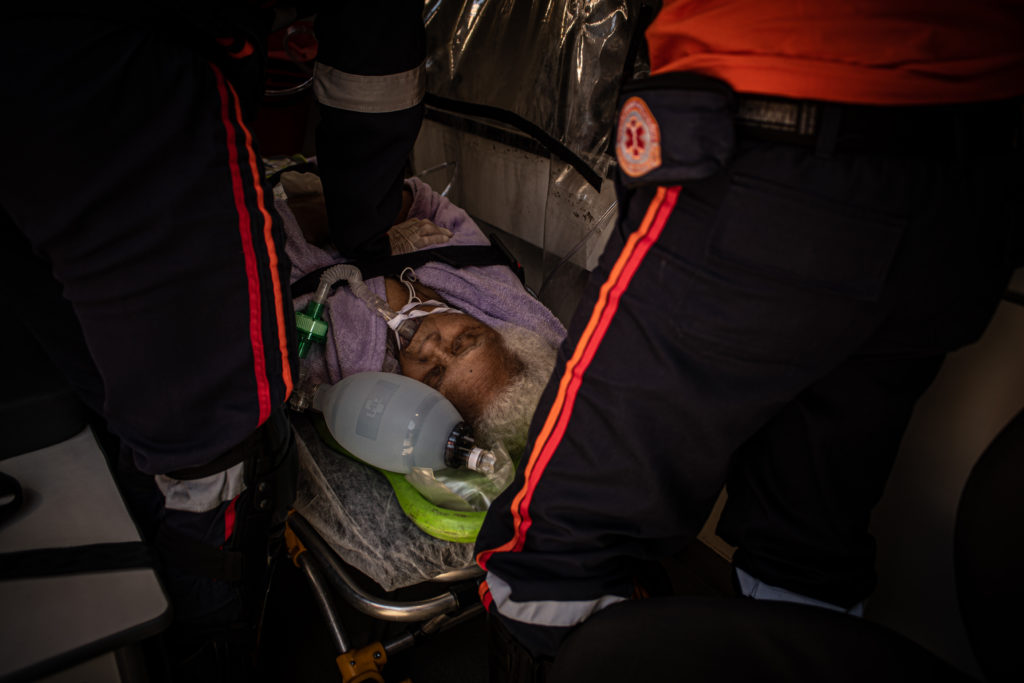
Members of the SAMU carrying a 84 years old woman with critical respiratory problems and lost her lung capacity. She was taken to the hospital but didn’t survive. The Mobile Emergency Care Service (SAMU 192) is a Brazilian pre-hospital emergency care service, used in urgent and emergency cases. It was conceived in France in 1986 as an urgent Service d'aide médicale - which uses the same acronym "SAMU" - and is considered by specialists as the best in the world. The city of São Paulo had 13 hospitals with intensive care unit (ICU) beds filled with patients from Covid-19 this Wednesday morning (10). Altogether, there were 9 state hospitals and 4 municipal hospitals with 100% capacity. This Wednesday 10/04/2021 Brazil surpassed the mark of 2 thousand deaths by Covid-19 registered in 24 hours: 2,349 lives lost. The 37 municipalities that make up the São Paulo Metropolitan Region held 23.6% of the Brazilian population, that is, 49 million inhabitants, according to a study released by IBGE (Brazilian Institute of Geography and Statistics) in 2018. During the COVID 19 crisis, the service has been essential for the rescue of people who are victims of the virus while still maintaining the care service for patients from all other areas. The service mainly serves the poorest part of the population.
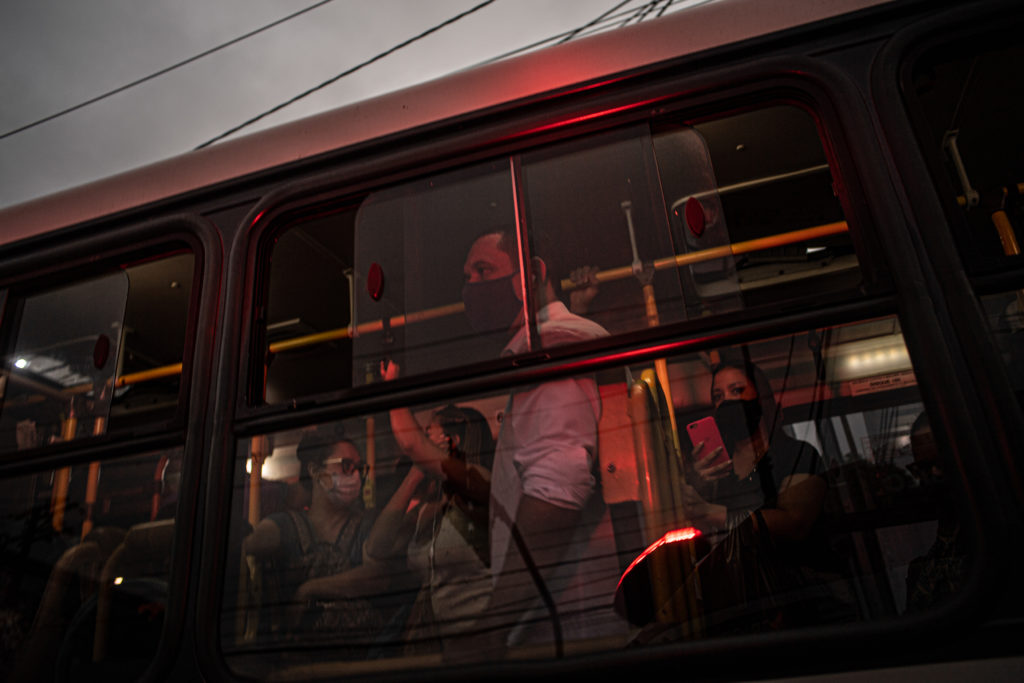
The state of São Paulo was declared a Red Zone by Governor João Doria. Only essential services could be functioning but the order has not been obeyed and the number of people gathering has not been satisfactorily decreasing. Public transport, one of the main causes of virus contamination, remains overcrowded. The city of São Paulo had 13 hospitals with intensive care unit (ICU) beds filled with patients from Covid-19 this Wednesday morning (10). Altogether, there were 9 state hospitals and 4 municipal hospitals with 100% capacity. This Wednesday 10/04/2021 Brazil surpassed the mark of 2 thousand deaths by Covid-19 registered in 24 hours: 2,349 lives lost. The Mobile Emergency Care Service (SAMU 192) is a Brazilian pre-hospital emergency care service, used in urgent and emergency cases. It was conceived in France in 1986 as an urgent Service d'aide médicale - which uses the same acronym "SAMU" - and is considered by specialists as the best in the world. The 37 municipalities that make up the São Paulo Metropolitan Region held 23.6% of the Brazilian population, that is, 49 million inhabitants, according to a study released by IBGE (Brazilian Institute of Geography and Statistics) in 2018. During the COVID 19 crisis, the service has been essential for the rescue of people who are victims of the virus while still maintaining the care service for patients from all other areas. The service mainly serves the poorest part of the population.
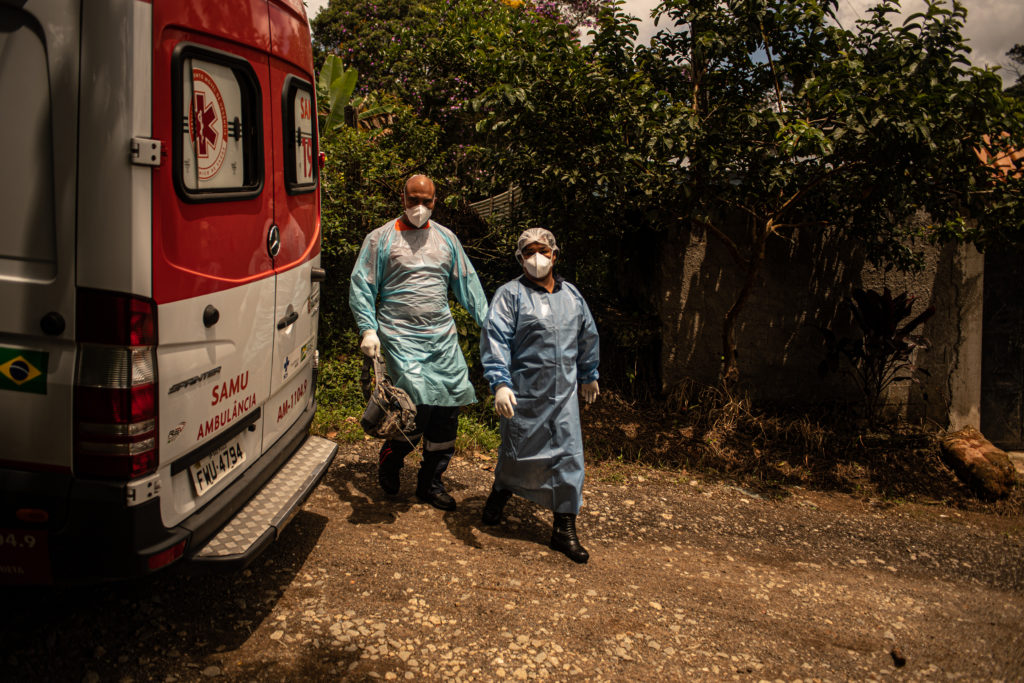
Metical team arriving. The woman had sequelae resulting from a stroke and was unable to move or communicate. She had been hospitalized a few days earlier and her family suspected that she might have contracted the new coronavirus at the hospital. Parelheiros is one of 96 districts of the city of São Paulo. Located in the subprefecture of Parelheiros in the extreme south of the city, it is one of the largest and most rural districts. Very little of this area is inhabited, and is covered with reserves of the Atlantic Forest. In Parelheiros there are also two indigenous villages of a Guaraní subgroup with about one thousand residents. The region also received many German immigrants in the beginning of 1800. The inhabitants of the place have the lowest purchasing power of the city. The district is poorly served by public transport and roads; there is little connection to the central districts of the city. The city of São Paulo had 13 hospitals with intensive care unit (ICU) beds filled with patients from Covid-19 this Wednesday morning (10). Altogether, there were 9 state hospitals and 4 municipal hospitals with 100% capacity. This Wednesday 10/04/2021 Brazil surpassed the mark of 2 thousand deaths by Covid-19 registered in 24 hours: 2,349 lives lost. The Mobile Emergency Care Service (SAMU 192) is a Brazilian pre-hospital emergency care service, used in urgent and emergency cases. It was conceived in France in 1986 as an urgent Service d'aide médicale - which uses the same acronym "SAMU" - and is considered by specialists as the best in the world. The 37 municipalities that make up the São Paulo Metropolitan Region held 23.6% of the Brazilian population, that is, 49 million inhabitants, according to a study released by IBGE (Brazilian Institute of Geography and Statistics) in 2018. During the COVID 19 crisis, the service has been essential for the rescue of people who are victims of the virus while still maintaining the care service for patients from all oth
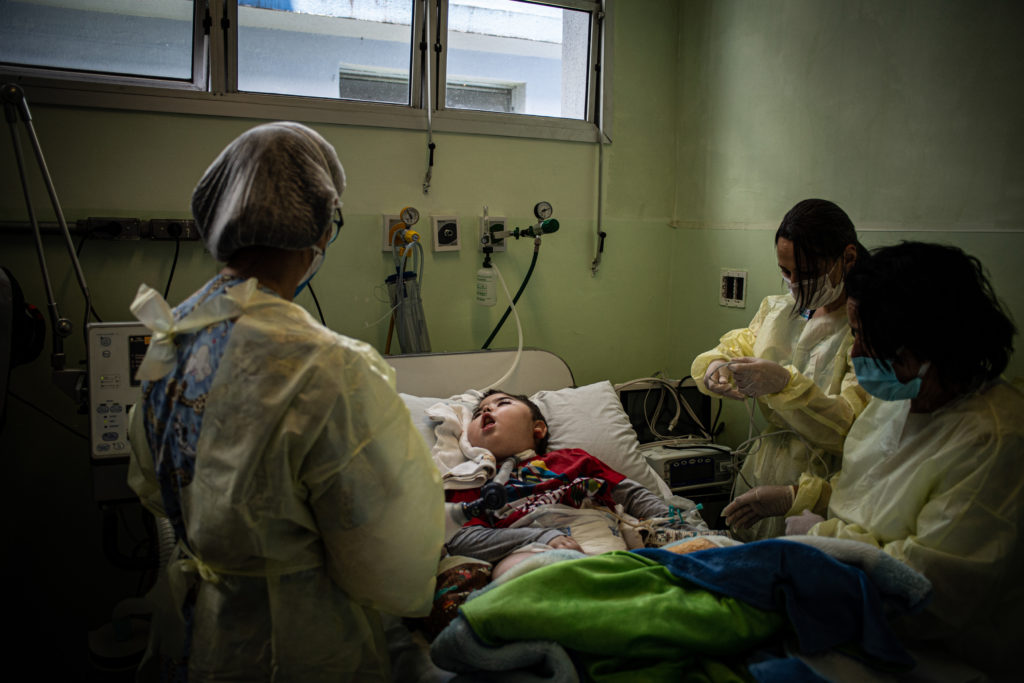
Trying to avoid the complete collapse of the health-care system, doctors and nurses in the main hospital in Santo André, a municipality of 720,000 inhabitants in the metropolitan area of São Paulo, are working on an emergency scheme to transfer patients from the pediatric ward to basic care unit. The goal is to transform all hospital wards into intensive care wards to treat people infected with the COVID-19 virus. The new strain of the virus first found in the city of Manaus in December 2020, more transmissible and apparently more aggressive, which in January caused hospitals in the city to run out of oxygen, causing the death of hundreds of people is spreading fast throughout the country causing the number of infections, hospitalizations and deaths to increase at an alarming rate. A survey by the Oswaldo Cruz Foundation pointed out that at this moment, the occupation of intensive care units (ICUs) by covid-19 in the Unified Health System (SUS) is in an "extremely critical situation", with 15 capitals exceeding 90%. The researchers at the Covid-19 Observatory of Fiocruz published on 03/09/2021 a special edition of the bulletin that follows the pandemic's evolution to warn about the worsening, causing death records since February. For the first time since the beginning of the pandemic, the daily average of deaths in seven days exceeded 1,500 cases. Illegal crowds during the carnival, the rapid spread of more variant Covid-19 infections, denialism, refusal to use face masks, insistence on ineffective treatments with proven ineffective drugs in some cases harmful to COVID-infected patients are some of the main factors attributed to the increase in the number of hospitalizations and contagions. The boy Reinado Pereira da Silva, just five years old, has lived in the hospital's paediatrics department practically since he was born. Born with severe congenital disease, the boy needs medical care 24 hours a day. Five cities in the metropolitan area of São Paulo, the
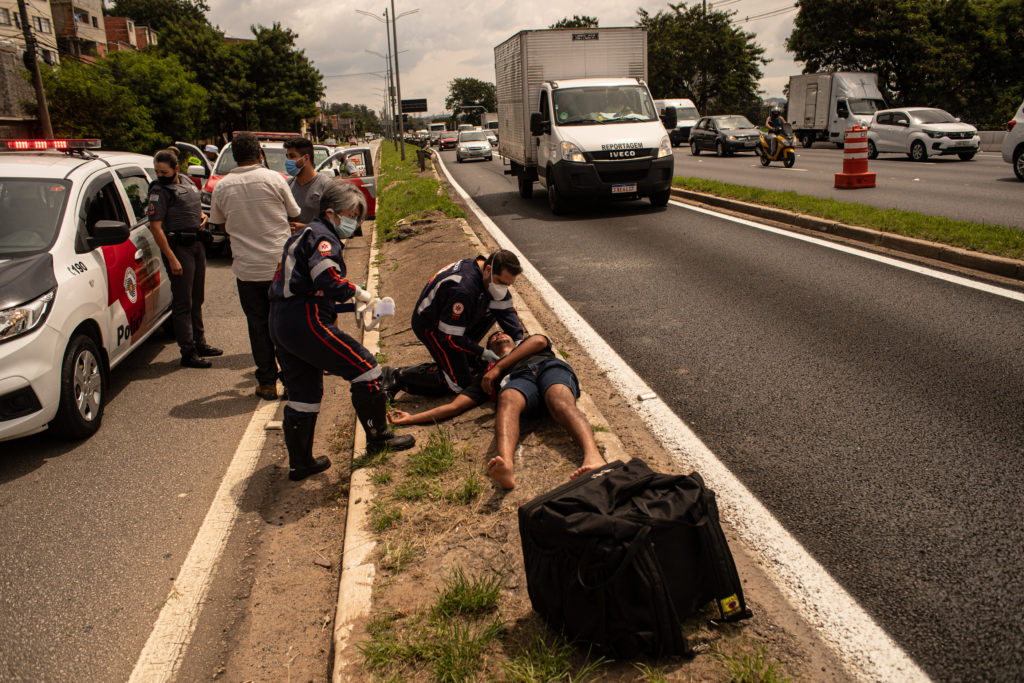
Members of the SAMU rescuing a 23 years old delivery worker who suffered a motorbike accident in São Paulo. The Brazilian government of Jair Messias Bolsonaro refused to impose preventive restrictions to slow down the number of infections in Brazil and all the services and business have been functioning as normal. One of the secondary consequences of it is that the hospitals, already overloaded with COVID patients have also been dealing with the cases that could be avoid if the population stayed at home as for example, work and traffic accidents. The city of São Paulo had 13 hospitals with intensive care unit (ICU) beds filled with patients from Covid-19 this Wednesday morning (10). Altogether, there were 9 state hospitals and 4 municipal hospitals with 100% capacity. This Wednesday 10/04/2021 Brazil surpassed the mark of 2 thousand deaths by Covid-19 registered in 24 hours: 2,349 lives lost. The Mobile Emergency Care Service (SAMU 192) is a Brazilian pre-hospital emergency care service, used in urgent and emergency cases. It was conceived in France in 1986 as an urgent Service d'aide médicale - which uses the same acronym "SAMU" - and is considered by specialists as the best in the world. The 37 municipalities that make up the São Paulo Metropolitan Region held 23.6% of the Brazilian population, that is, 49 million inhabitants, according to a study released by IBGE (Brazilian Institute of Geography and Statistics) in 2018. During the COVID 19 crisis, the service has been essential for the rescue of people who are victims of the virus while still maintaining the care service for patients from all other areas. The service mainly serves the poorest part of the population.
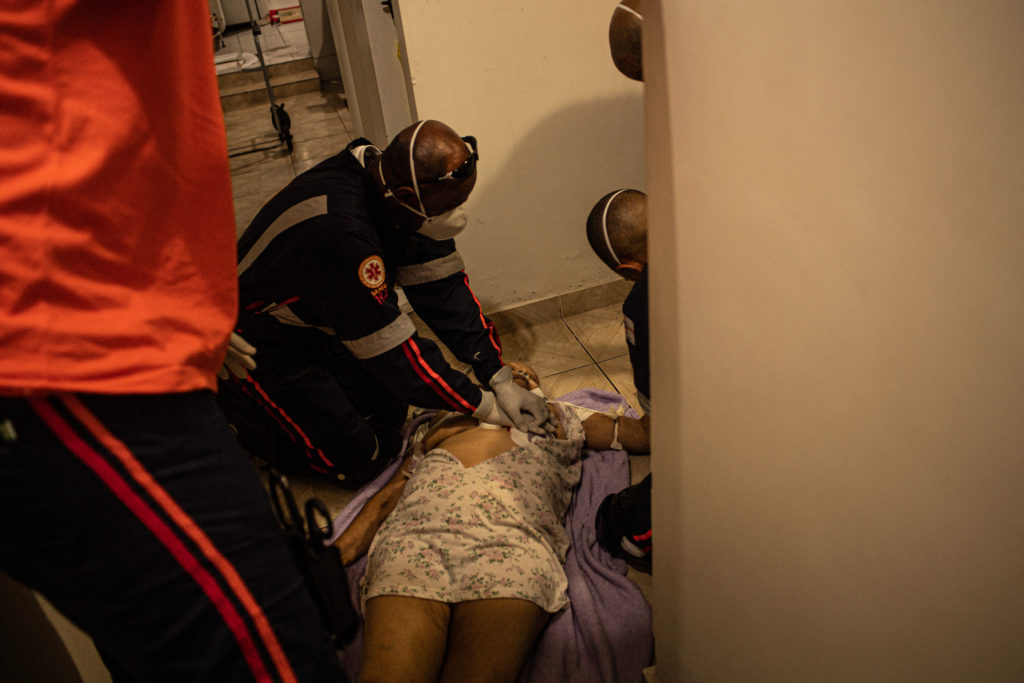
Members of the SAMU assisting a 84 years old woman with Cardiopulmonary resuscitation (CPR). The woman had critical respiratory problems and lost her lung capacity. She was taken to the hospital but didn’t survive. The Mobile Emergency Care Service (SAMU 192) is a Brazilian pre-hospital emergency care service, used in urgent and emergency cases. It was conceived in France in 1986 as an urgent Service d'aide médicale - which uses the same acronym "SAMU" - and is considered by specialists as the best in the world. The city of São Paulo had 13 hospitals with intensive care unit (ICU) beds filled with patients from Covid-19 this Wednesday morning (10). Altogether, there were 9 state hospitals and 4 municipal hospitals with 100% capacity. This Wednesday 10/04/2021 Brazil surpassed the mark of 2 thousand deaths by Covid-19 registered in 24 hours: 2,349 lives lost. The 37 municipalities that make up the São Paulo Metropolitan Region held 23.6% of the Brazilian population, that is, 49 million inhabitants, according to a study released by IBGE (Brazilian Institute of Geography and Statistics) in 2018. During the COVID 19 crisis, the service has been essential for the rescue of people who are victims of the virus while still maintaining the care service for patients from all other areas. The service mainly serves the poorest part of the population.
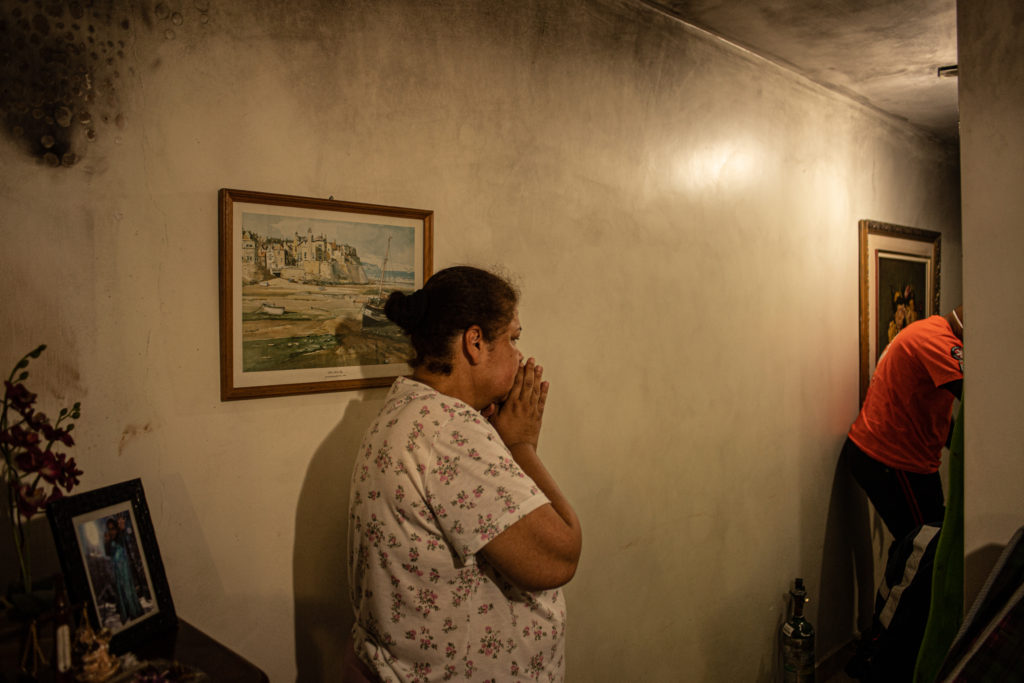
Members of the SAMU assisting a 84 years old woman with Cardiopulmonary resuscitation (CPR). The woman had critical respiratory problems and lost her lung capacity. She was taken to the hospital but didn’t survive. In this picture, her daughter observes the medical team assisting her mother. The city of São Paulo had 13 hospitals with intensive care unit (ICU) beds filled with patients from Covid-19 this Wednesday morning (10). Altogether, there were 9 state hospitals and 4 municipal hospitals with 100% capacity. This Wednesday 10/04/2021 Brazil surpassed the mark of 2 thousand deaths by Covid-19 registered in 24 hours: 2,349 lives lost. The Mobile Emergency Care Service (SAMU 192) is a Brazilian pre-hospital emergency care service, used in urgent and emergency cases. It was conceived in France in 1986 as an urgent Service d'aide médicale - which uses the same acronym "SAMU" - and is considered by specialists as the best in the world. The 37 municipalities that make up the São Paulo Metropolitan Region held 23.6% of the Brazilian population, that is, 49 million inhabitants, according to a study released by IBGE (Brazilian Institute of Geography and Statistics) in 2018. During the COVID 19 crisis, the service has been essential for the rescue of people who are victims of the virus while still maintaining the care service for patients from all other areas. The service mainly serves the poorest part of the population.
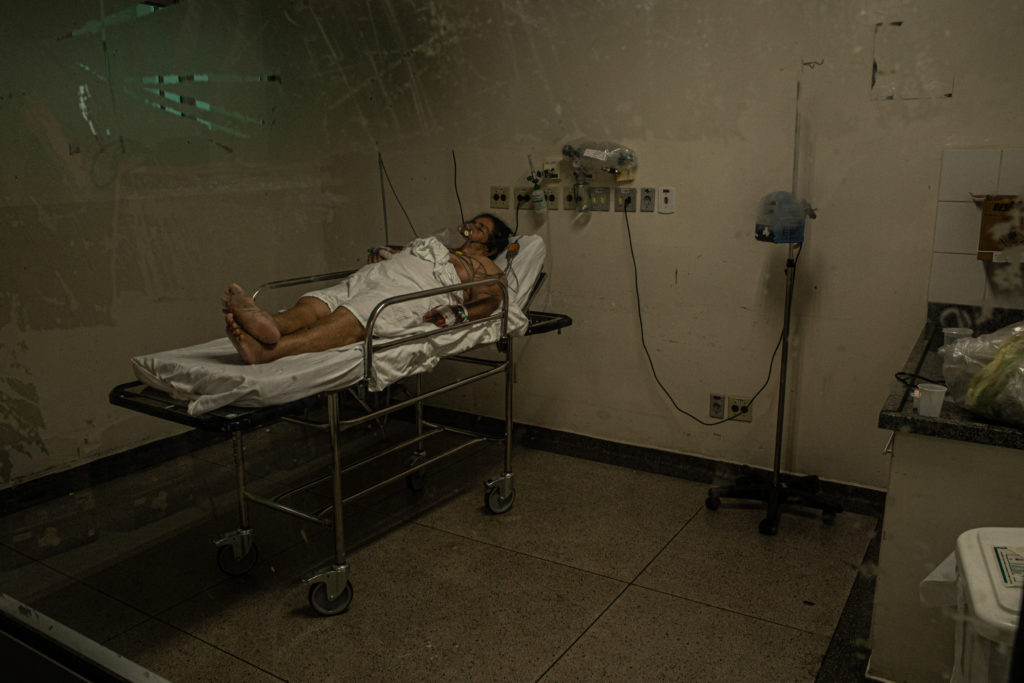
Reference in treatment for Covid, the main hospital in Botucatu has a full ICU and patients on the waiting list A woman at the emergency room at the hospital in Botucatu. The intensive care unit of the hospital is operating today with 20% above it’s capacity and by March 21, 2021, another 32 persons were waiting to be hospitalised in the ICU of that hospital. In São Paulo, more than 130 people with Covid-19 died waiting for an ICU bed among these a 3-year-old boy and 25-year-old male. The city of São Paulo had 13 hospitals with intensive care unit (ICU) beds filled with patients from Covid-19 this Wednesday morning (10). Altogether, there were 9 state hospitals and 4 municipal hospitals with 100% capacity. This Wednesday 10/04/2021 Brazil surpassed the mark of 2 thousand deaths by Covid-19 registered in 24 hours: 2,349 lives lost. The Mobile Emergency Care Service (SAMU 192) is a Brazilian pre-hospital emergency care service, used in urgent and emergency cases. It was conceived in France in 1986 as an urgent Service d'aide médicale - which uses the same acronym "SAMU" - and is considered by specialists as the best in the world. The 37 municipalities that make up the São Paulo Metropolitan Region held 23.6% of the Brazilian population, that is, 49 million inhabitants, according to a study released by IBGE (Brazilian Institute of Geography and Statistics) in 2018. During the COVID 19 crisis, the service has been essential for the rescue of people who are victims of the virus while still maintaining the care service for patients from all other areas. The service mainly serves the poorest part of the population.
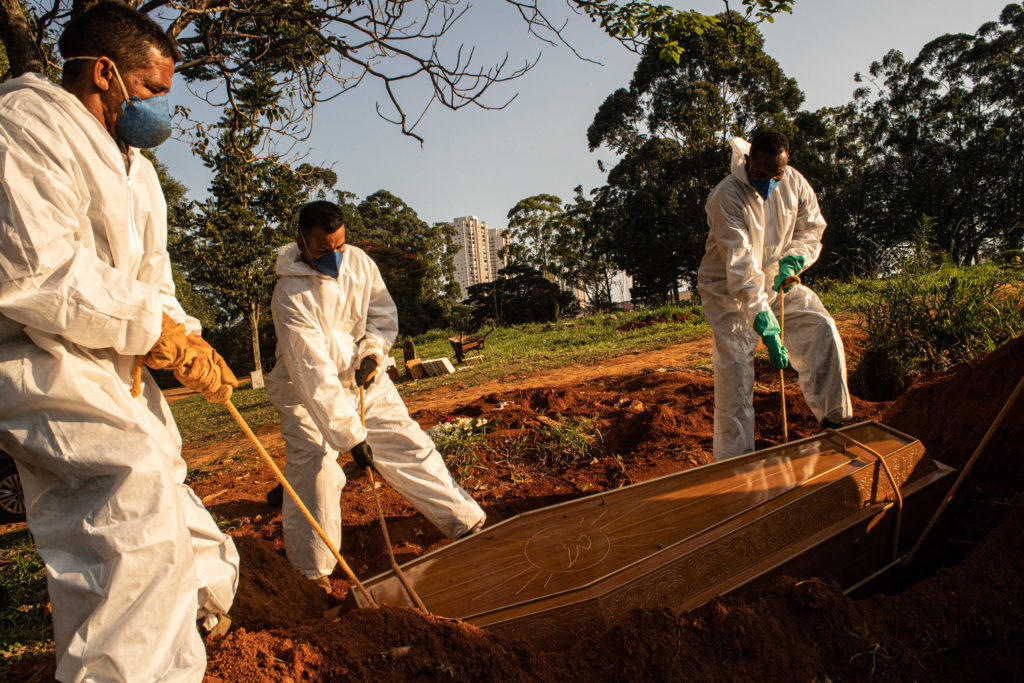
On 03/26/2021, Brazil again broke the mark of its worst day of the pandemic so far, with 3,650,000 deaths by Covid recorded in 24 hours. With that, the country now totals 307,326 deaths since the beginning of the pandemic. Compared to the average of 14 days ago, the variation was + 32%, indicating an upward trend in deaths from the disease. The large number of new corpses buried in increasingly close and shallow graves attracts a group of hungry vultures that, together with the abandoned mean dogs, seek to feed on the remains of a corpse left unprotected by the little red soft soil that should cover it. New coffins keep coming. Many brought alone and many others in large white vans, carrying the bodies of 4 victims at once. Gravediggers, strong men, "good shovel men," say they can't sleep when they get back to their homes. The screams heard during the day accompany them to their dreams. "My dear daughter, get up and come home with me", shouted a woman who lost her daughter the day before when she and 2638 others were victims of what every day looks more like genocide. A grave digger playing with one of the stray dogs that live in the Vila Formosa Cemetery.
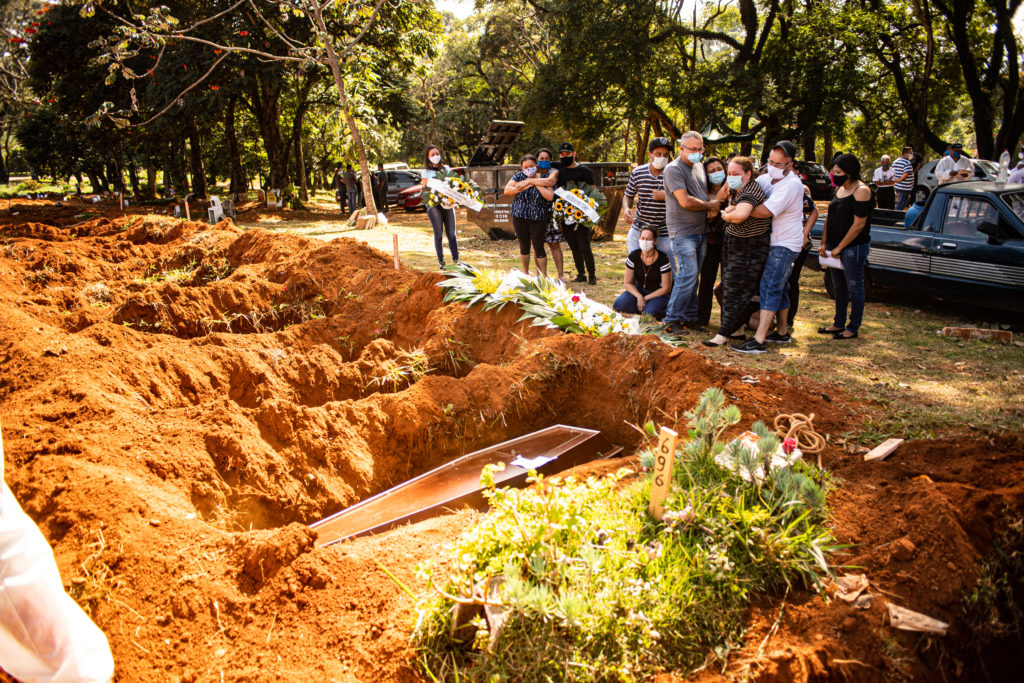
On 03/26/2021, Brazil again broke the mark of its worst day of the pandemic so far, with 3,650,000 deaths by Covid recorded in 24 hours. With that, the country now totals 307,326 deaths since the beginning of the pandemic. Compared to the average of 14 days ago, the variation was + 32%, indicating an upward trend in deaths from the disease. The large number of new corpses buried in increasingly close and shallow graves attracts a group of hungry vultures that, together with the abandoned mean dogs, seek to feed on the remains of a corpse left unprotected by the little red soft soil that should cover it. New coffins keep coming. Many brought alone and many others in large white vans, carrying the bodies of 4 victims at once. Gravediggers, strong men, "good shovel men," say they can't sleep when they get back to their homes. The screams heard during the day accompany them to their dreams. "My dear daughter, get up and come home with me", shouted a woman who lost her daughter the day before when she and 2638 others were victims of what every day looks more like genocide. A grave digger playing with one of the stray dogs that live in the Vila Formosa Cemetery.
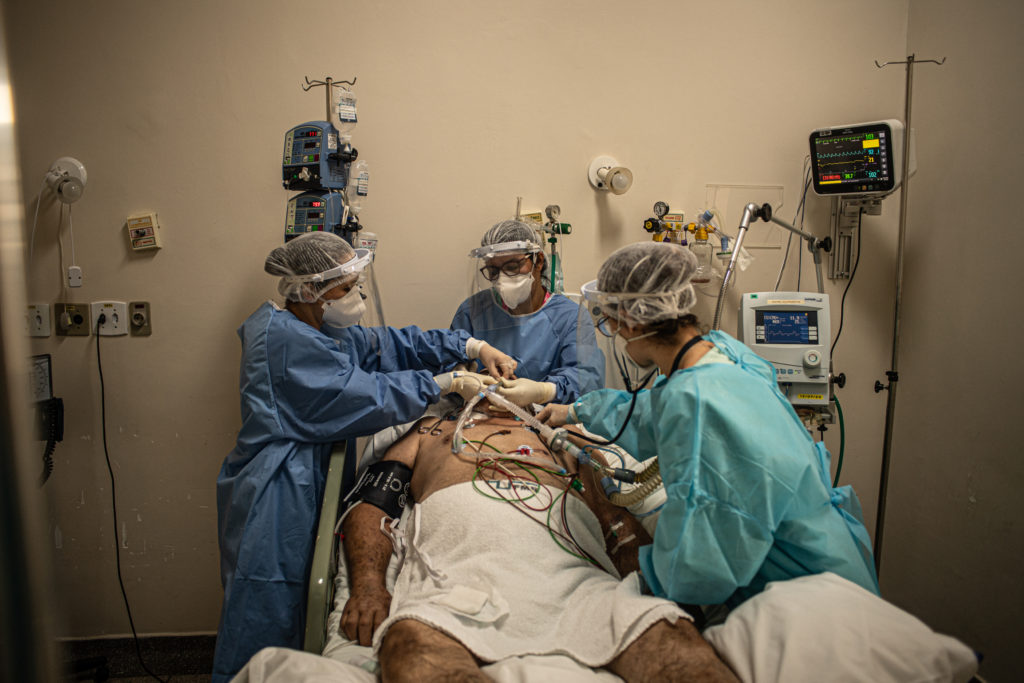
Reference in treatment for Covid, the main hospital in Botucatu has a full ICU and patients on the waiting list Nursing assistant Jacilene Rosa de Lima Almeida, 40 years old, decided she would like to work in a hospital after being hospitalized in intensive care at the age of 22. The onset of the crisis caused by the new Coronavirus came as a surprise all over the world, but Jacilene did not refuse to continue her work, which soon became that of caring for patients in an advanced stage of the disease. In July 2020, Jacilene discovered that she had contracted the virus, even though she remained asymptomatic. Her husband, her first love and a partner of 26 years together, also fell ill and died in the same hospital and department where Jacilene works every day. As soon as he recovered, Jacilene insisted on going back to work and continuing to help save lives. Today she lives with one of her two children. A 13-year-old boy who carries the same passion that his father had for music. In São Paulo, more than 130 people with Covid-19 died waiting for an ICU bed among these a 3-year-old boy and 25-year-old male. The city of São Paulo had 13 hospitals with intensive care unit (ICU) beds filled with patients from Covid-19 this Wednesday morning (10). Altogether, there were 9 state hospitals and 4 municipal hospitals with 100% capacity. This Wednesday 10/04/2021 Brazil surpassed the mark of 2 thousand deaths by Covid-19 registered in 24 hours: 2,349 lives lost. The Mobile Emergency Care Service (SAMU 192) is a Brazilian pre-hospital emergency care service, used in urgent and emergency cases. It was conceived in France in 1986 as an urgent Service d'aide médicale - which uses the same acronym "SAMU" - and is considered by specialists as the best in the world. The 37 municipalities that make up the São Paulo Metropolitan Region held 23.6% of the Brazilian population, that is, 49 million inhabitants, according to a study released by IBGE (Brazilian Institute of Geogra
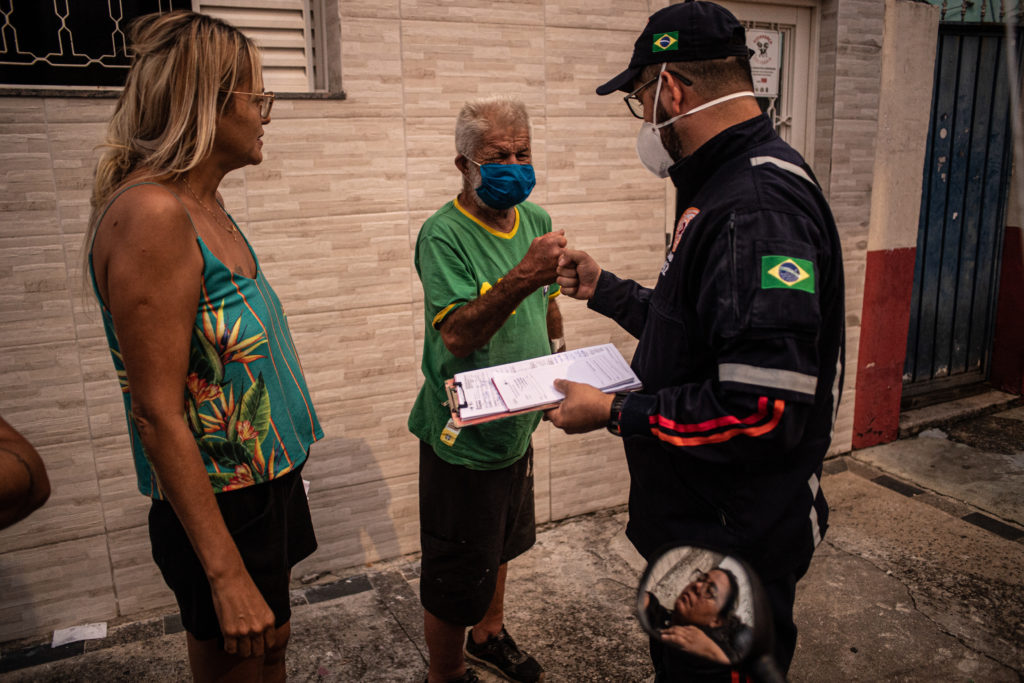
Dr Arley creating a 65 years old homeless man called Luiz, known as “Levinha”. The SAMU team was called upon to rescue a person who was lying unconscious on a street. Dr Aley mentioned that the call could be from a person just drunk, which was confirmed by the arrival of the team. The city of São Paulo had 13 hospitals with intensive care unit (ICU) beds filled with patients from Covid-19 this Wednesday morning (10). Altogether, there were 9 state hospitals and 4 municipal hospitals with 100% capacity. This Wednesday 10/04/2021 Brazil surpassed the mark of 2 thousand deaths by Covid-19 registered in 24 hours: 2,349 lives lost. The Mobile Emergency Care Service (SAMU 192) is a Brazilian pre-hospital emergency care service, used in urgent and emergency cases. It was conceived in France in 1986 as an urgent Service d'aide médicale - which uses the same acronym "SAMU" - and is considered by specialists as the best in the world. The 37 municipalities that make up the São Paulo Metropolitan Region held 23.6% of the Brazilian population, that is, 49 million inhabitants, according to a study released by IBGE (Brazilian Institute of Geography and Statistics) in 2018. During the COVID 19 crisis, the service has been essential for the rescue of people who are victims of the virus while still maintaining the care service for patients from all other areas. The service mainly serves the poorest part of the population.
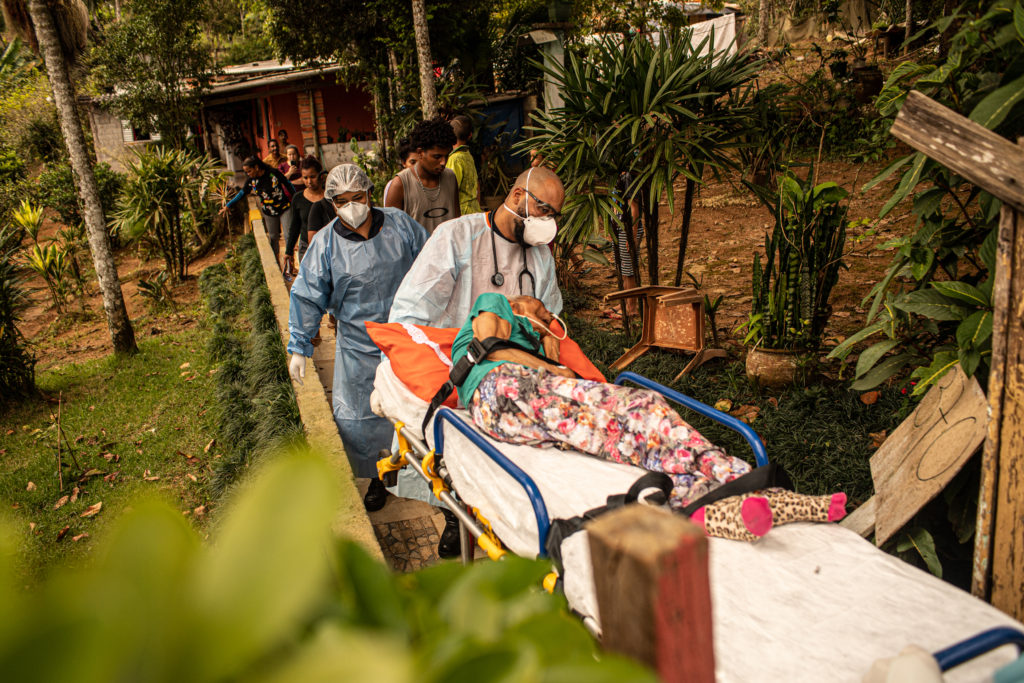
The woman had sequelae resulting from a stroke and was unable to move or communicate. She had been hospitalized a few days earlier and her family suspected that she might have contracted the new coronavirus at the hospital. Parelheiros is one of 96 districts of the city of São Paulo. Located in the subprefecture of Parelheiros in the extreme south of the city, it is one of the largest and most rural districts. Very little of this area is inhabited, and is covered with reserves of the Atlantic Forest. In Parelheiros there are also two indigenous villages of a Guaraní subgroup with about one thousand residents. The region also received many German immigrants in the beginning of 1800. The inhabitants of the place have the lowest purchasing power of the city. The district is poorly served by public transport and roads; there is little connection to the central districts of the city. The city of São Paulo had 13 hospitals with intensive care unit (ICU) beds filled with patients from Covid-19 this Wednesday morning (10). Altogether, there were 9 state hospitals and 4 municipal hospitals with 100% capacity. This Wednesday 10/04/2021 Brazil surpassed the mark of 2 thousand deaths by Covid-19 registered in 24 hours: 2,349 lives lost. The Mobile Emergency Care Service (SAMU 192) is a Brazilian pre-hospital emergency care service, used in urgent and emergency cases. It was conceived in France in 1986 as an urgent Service d'aide médicale - which uses the same acronym "SAMU" - and is considered by specialists as the best in the world. The 37 municipalities that make up the São Paulo Metropolitan Region held 23.6% of the Brazilian population, that is, 49 million inhabitants, according to a study released by IBGE (Brazilian Institute of Geography and Statistics) in 2018. During the COVID 19 crisis, the service has been essential for the rescue of people who are victims of the virus while still maintaining the care service for patients from all other areas. The service ma
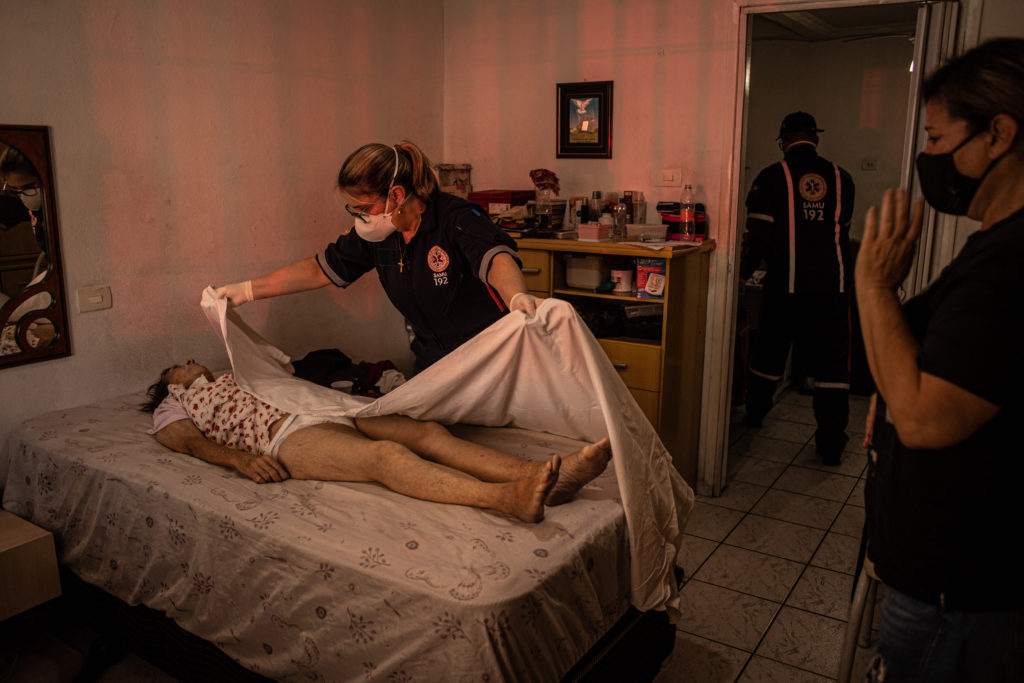
The SAMU team arrived to rescue a 84 years Elvira Santos with a cardiac arrest. Her daughter mentioned her as a very active and independent woman that used to go by herself to the supermarket and other places to solve her daily life routines. She had started to feel ill with pain in her head and body only 3 days before when she lost her consciousness while waiting for a buss just a few meter away from the house she lived. She lost once again her consciousness that morning and feel to the floor where the medics found her. The doctors tried to reanimate her for about 10 minutes before declaring her dead. The city of São Paulo had 13 hospitals with intensive care unit (ICU) beds filled with patients from Covid-19 this Wednesday morning (10). Altogether, there were 9 state hospitals and 4 municipal hospitals with 100% capacity. This Wednesday 10/04/2021 Brazil surpassed the mark of 2 thousand deaths by Covid-19 registered in 24 hours: 2,349 lives lost. The Mobile Emergency Care Service (SAMU 192) is a Brazilian pre-hospital emergency care service, used in urgent and emergency cases. It was conceived in France in 1986 as an urgent Service d'aide médicale - which uses the same acronym "SAMU" - and is considered by specialists as the best in the world. The 37 municipalities that make up the São Paulo Metropolitan Region held 23.6% of the Brazilian population, that is, 49 million inhabitants, according to a study released by IBGE (Brazilian Institute of Geography and Statistics) in 2018. During the COVID 19 crisis, the service has been essential for the rescue of people who are victims of the virus while still maintaining the care service for patients from all other areas. The service mainly serves the poorest part of the population.
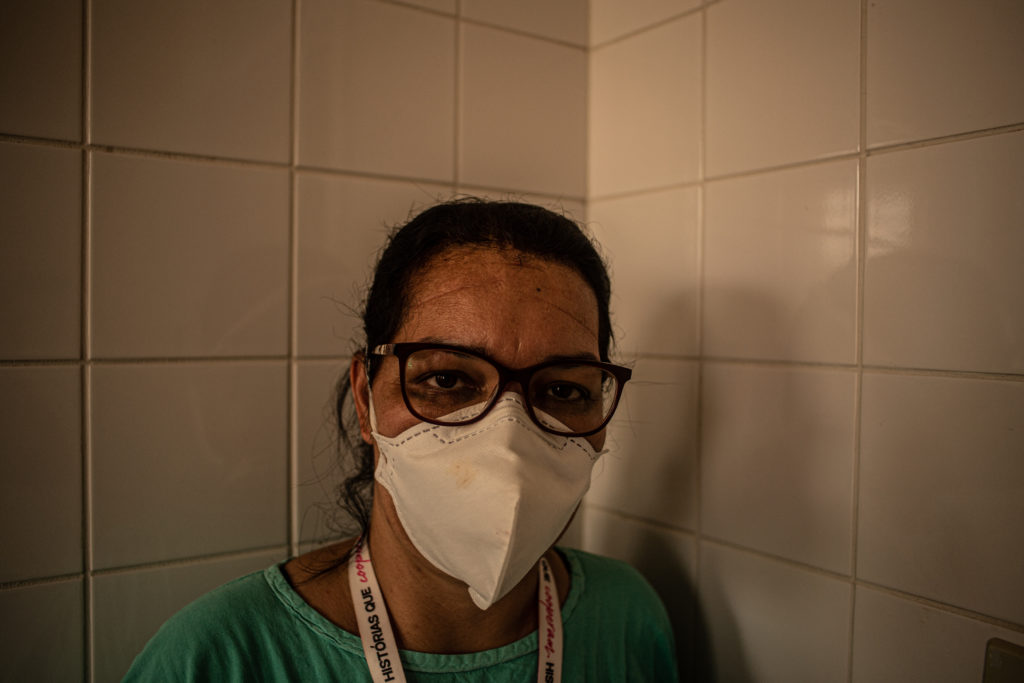
Reference in treatment for Covid, the main hospital in Botucatu has a full ICU and patients on the waiting list Nursing assistant Jacilene Rosa de Lima Almeida, 40 years old, decided she would like to work in a hospital after being hospitalized in intensive care at the age of 22. The onset of the crisis caused by the new Coronavirus came as a surprise all over the world, but Jacilene did not refuse to continue her work, which soon became that of caring for patients in an advanced stage of the disease. In July 2020, Jacilene discovered that she had contracted the virus, even though she remained asymptomatic. Her husband, her first love and a partner of 26 years together, also fell ill and died in the same hospital and department where Jacilene works every day. As soon as he recovered, Jacilene insisted on going back to work and continuing to help save lives. Today she lives with one of her two children. A 13-year-old boy who carries the same passion that his father had for music. In São Paulo, more than 130 people with Covid-19 died waiting for an ICU bed among these a 3-year-old boy and 25-year-old male. The city of São Paulo had 13 hospitals with intensive care unit (ICU) beds filled with patients from Covid-19 this Wednesday morning (10). Altogether, there were 9 state hospitals and 4 municipal hospitals with 100% capacity. This Wednesday 10/04/2021 Brazil surpassed the mark of 2 thousand deaths by Covid-19 registered in 24 hours: 2,349 lives lost. The Mobile Emergency Care Service (SAMU 192) is a Brazilian pre-hospital emergency care service, used in urgent and emergency cases. It was conceived in France in 1986 as an urgent Service d'aide médicale - which uses the same acronym "SAMU" - and is considered by specialists as the best in the world. The 37 municipalities that make up the São Paulo Metropolitan Region held 23.6% of the Brazilian population, that is, 49 million inhabitants, according to a study released by IBGE (Brazilian Institute of Geogra
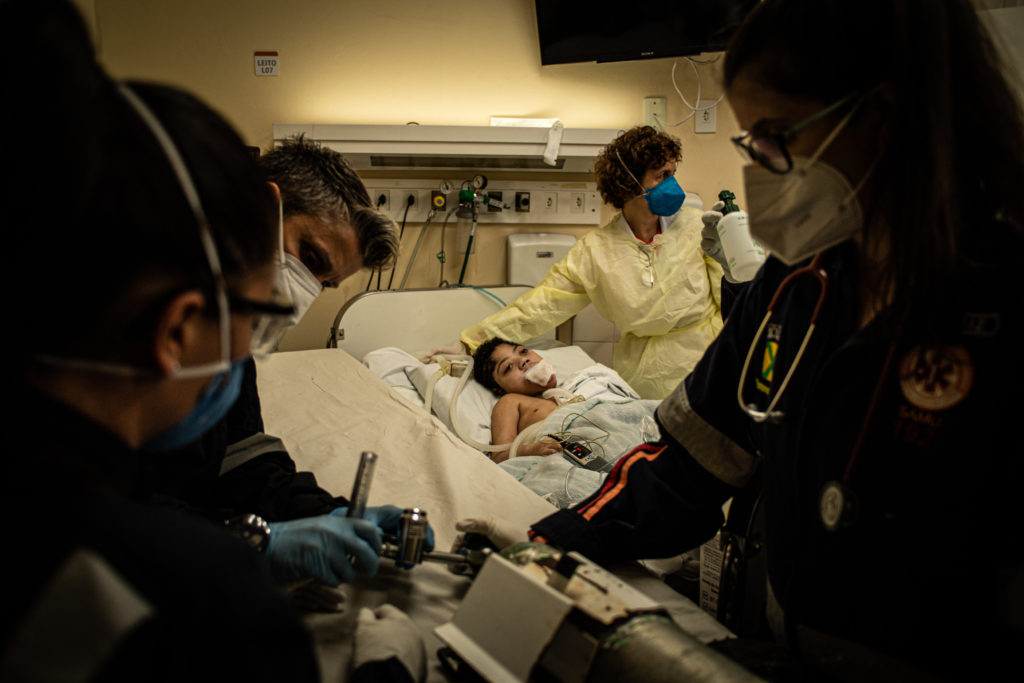
Trying to avoid the complete collapse of the health-care system, doctors and nurses in the main hospital in Santo André, a municipality of 720,000 inhabitants in the metropolitan area of São Paulo, are working on an emergency scheme to transfer patients from the pediatric ward to basic care unit. The goal is to transform all hospital wards into intensive care wards to treat people infected with the COVID-19 virus. The new strain of the virus first found in the city of Manaus in December 2020, more transmissible and apparently more aggressive, which in January caused hospitals in the city to run out of oxygen, causing the death of hundreds of people is spreading fast throughout the country causing the number of infections, hospitalizations and deaths to increase at an alarming rate. A survey by the Oswaldo Cruz Foundation pointed out that at this moment, the occupation of intensive care units (ICUs) by covid-19 in the Unified Health System (SUS) is in an "extremely critical situation", with 15 capitals exceeding 90%. The researchers at the Covid-19 Observatory of Fiocruz published on 03/09/2021 a special edition of the bulletin that follows the pandemic's evolution to warn about the worsening, causing death records since February. For the first time since the beginning of the pandemic, the daily average of deaths in seven days exceeded 1,500 cases. Illegal crowds during the carnival, the rapid spread of more variant Covid-19 infections, denialism, refusal to use face masks, insistence on ineffective treatments with proven ineffective drugs in some cases harmful to COVID-infected patients are some of the main factors attributed to the increase in the number of hospitalizations and contagions. The boy Reinado Pereira da Silva, just five years old, has lived in the hospital's paediatrics department practically since he was born. Born with severe congenital disease, the boy needs medical care 24 hours a day. Five cities in the metropolitan area of São Paulo, the
A study published in the medical journal International Journal of Gynecology and Obstetrics in June 2020, revealed that, from the beginning of the pandemic until June 18, 160 deaths of pregnant and postpartum women worldwide were reported by Covid-19, 124 of them in Brazil. These figures show that the country is responsible for 77% of the world’s deaths. The paper, entitled The Covid-19 Tragedy in Brazil, brings other numbers also exposing the lack of access to assistance.
In the 2021, the weekly average maternal deaths from Covid in 2021 is more than twice as high as 2020
Lack of access to the ICU and intubation affects up to a third of pregnant women and postpartum women who died during the pandemic.
According to the latest update, on April 7, since the beginning of the pandemic, there were 9,479 cases of hospitalization by Covid among pregnant women and puerperal women, with 738 deaths.
There are another 9,784 records of SARS (severe acute respiratory syndrome) not specified in this group, with 250 deaths. For the researchers, there is a great possibility that these cases are also Covid.
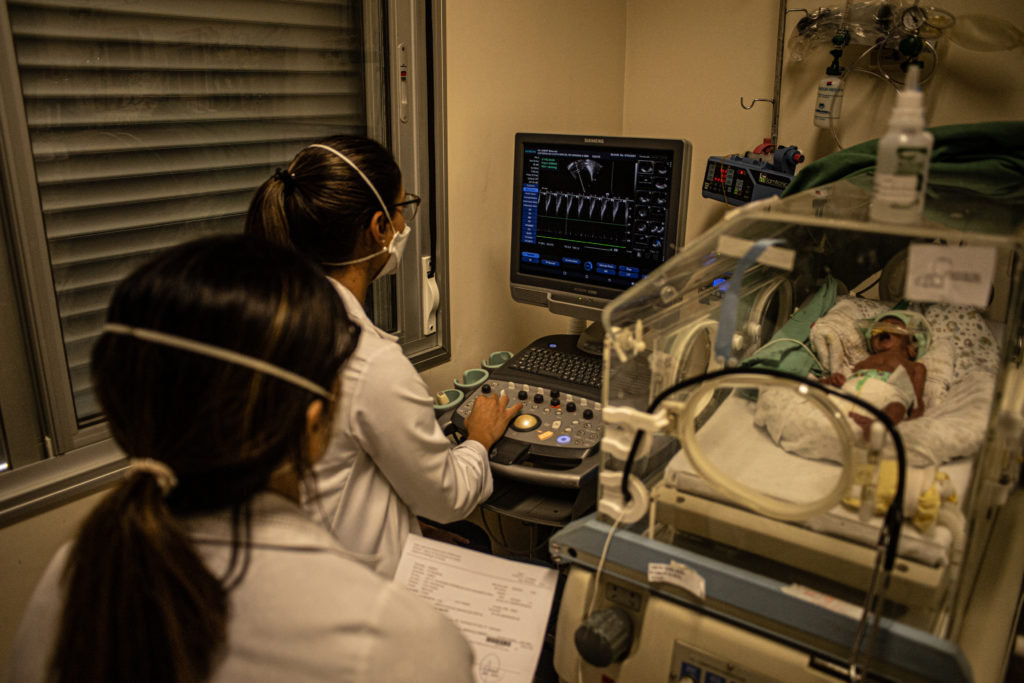
A study published in the medical journal International Journal of Gynecology and Obstetrics in June 2020, revealed that, from the beginning of the pandemic until June 18, 160 deaths of pregnant and postpartum women worldwide were reported by Covid-19, 124 of them in Brazil. These figures show that the country is responsible for 77% of the world's deaths. The paper, entitled The Covid-19 Tragedy in Brazil, brings other numbers also exposing the lack of access to assistance. In the 2021, the weekly average maternal deaths from Covid in 2021 is more than twice as high as 2020 Lack of access to the ICU and intubation affects up to a third of pregnant women and postpartum women who died during the pandemic. According to the latest update, on April 7, since the beginning of the pandemic, there were 9,479 cases of hospitalization by Covid among pregnant women and puerperal women, with 738 deaths. There are another 9,784 records of SARS (severe acute respiratory syndrome) not specified in this group, with 250 deaths. For the researchers, there is a great possibility that these cases are also Covid. A baby born prematurely of a mother infected with the COVID-19 virus. In addition to being premature, a PCR test found that the baby was infected with the virus and was therefore being kept in isolation in the intensive care department of the maternity at the Botucatu University Hospital. On 16/04/2021, the secretary of Primary Health Care of the Brazilian Ministry of Health, Raphael Parente, asked women to postpone their plans to become pregnant until there is an improvement of the pandemic, if possible. "If possible, postpone the pregnancy a little, for a better time, when you can have your pregnancy more calmly. We know that at the time of Zika, during one, two years, there was a decrease in pregnancies in Brazil, and then it increased. It's normal. Obviously, we can't say this to someone who is 42, 43 years old, but for a young woman, who can choose her pregnancy moment
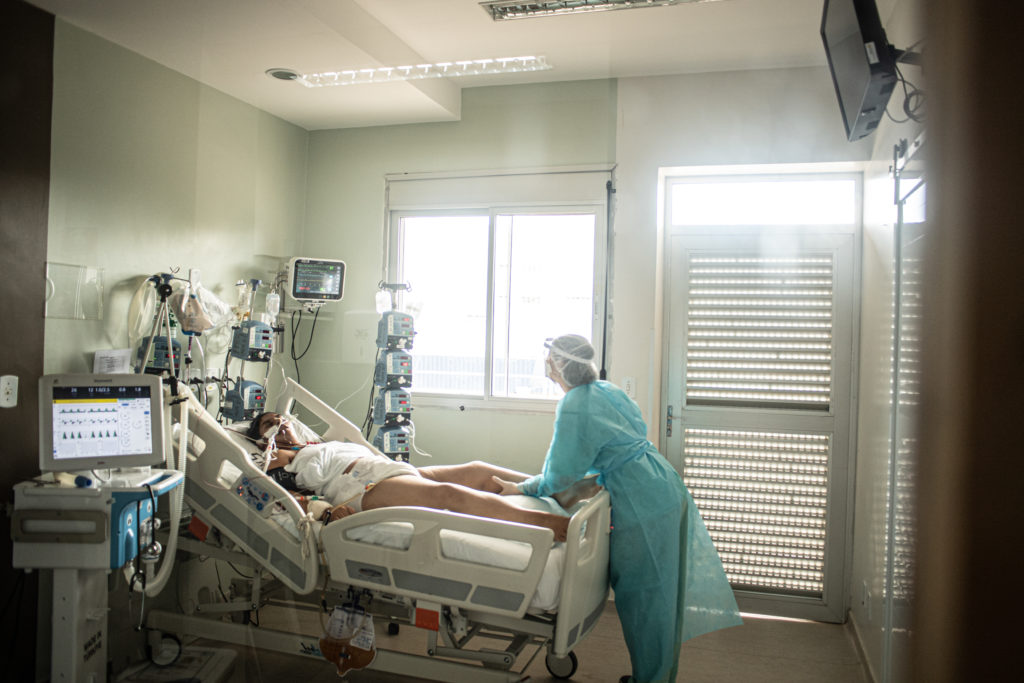
A study published in the medical journal International Journal of Gynecology and Obstetrics in June 2020, revealed that, from the beginning of the pandemic until June 18, 160 deaths of pregnant and postpartum women worldwide were reported by Covid-19, 124 of them in Brazil. These figures show that the country is responsible for 77% of the world's deaths. The paper, entitled The Covid-19 Tragedy in Brazil, brings other numbers also exposing the lack of access to assistance. In the 2021, the weekly average maternal deaths from Covid in 2021 is more than twice as high as 2020 Lack of access to the ICU and intubation affects up to a third of pregnant women and postpartum women who died during the pandemic. According to the latest update, on April 7, since the beginning of the pandemic, there were 9,479 cases of hospitalization by Covid among pregnant women and puerperal women, with 738 deaths. There are another 9,784 records of SARS (severe acute respiratory syndrome) not specified in this group, with 250 deaths. For the researchers, there is a great possibility that these cases are also Covid. In this picture, doctor Damaris Souza Nassif assists 24 years old Bianca Falaguera Landegraf, hospitalised in the University Hospital in the city of Botucatu. Bianca was infected by her husband, who had contracted the disease at work but did not show any severe disease symptoms. Bianca was 34 weeks pregnant when she was hospitalized on March 22 with shortness of breath, saturating only 83%. Two days later, doctors decided that the baby's birth should be anticipated due to the mother's clinical condition. On March 24, her son Emmanuel was born after an emergency cesarean section, with the mother intubated and unconscious. Bianca remained intubated until April 13, after her clinical condition improved. On April 16, she can be discharged from the intensive care unit.

A study published in the medical journal International Journal of Gynecology and Obstetrics in June 2020, revealed that, from the beginning of the pandemic until June 18, 160 deaths of pregnant and postpartum women worldwide were reported by Covid-19, 124 of them in Brazil. These figures show that the country is responsible for 77% of the world's deaths. The paper, entitled The Covid-19 Tragedy in Brazil, brings other numbers also exposing the lack of access to assistance. In the 2021, the weekly average maternal deaths from Covid in 2021 is more than twice as high as 2020 Lack of access to the ICU and intubation affects up to a third of pregnant women and postpartum women who died during the pandemic. According to the latest update, on April 7, since the beginning of the pandemic, there were 9,479 cases of hospitalization by Covid among pregnant women and puerperal women, with 738 deaths. There are another 9,784 records of SARS (severe acute respiratory syndrome) not specified in this group, with 250 deaths. For the researchers, there is a great possibility that these cases are also Covid. A baby born prematurely of a mother infected with the COVID-19 virus. In addition to being premature, a PCR test found that the baby was infected with the virus and was therefore being kept in isolation in the intensive care department of the maternity at the Botucatu University Hospital. On 16/04/2021, the secretary of Primary Health Care of the Brazilian Ministry of Health, Raphael Parente, asked women to postpone their plans to become pregnant until there is an improvement of the pandemic, if possible. "If possible, postpone the pregnancy a little, for a better time, when you can have your pregnancy more calmly. We know that at the time of Zika, during one, two years, there was a decrease in pregnancies in Brazil, and then it increased. It's normal. Obviously, we can't say this to someone who is 42, 43 years old, but for a young woman, who can choose her pregnancy moment

Cases of pregnant and postpartum women who died due to covid-19 are increasingly frequent in Brazil, so much so that these two groups are considered at risk for the disease by the Brazilian Ministry of Health. A study by researchers from Fiocruz - Fundação Oswaldo Cruz - pointed out that the country had 363 maternal deaths related to the coronavirus until November 2020, representing about 20% of maternal deaths in relation to the statistics of 2018 and 2019. "Comparing with known data from developed countries, Brazil certainly has one of the worse rates ", said Marcos Nakamura, obstetrician and researcher at the National Institute of Health for Women, Children and Adolescents Fernandes Figueira (IFF / Fiocruz).
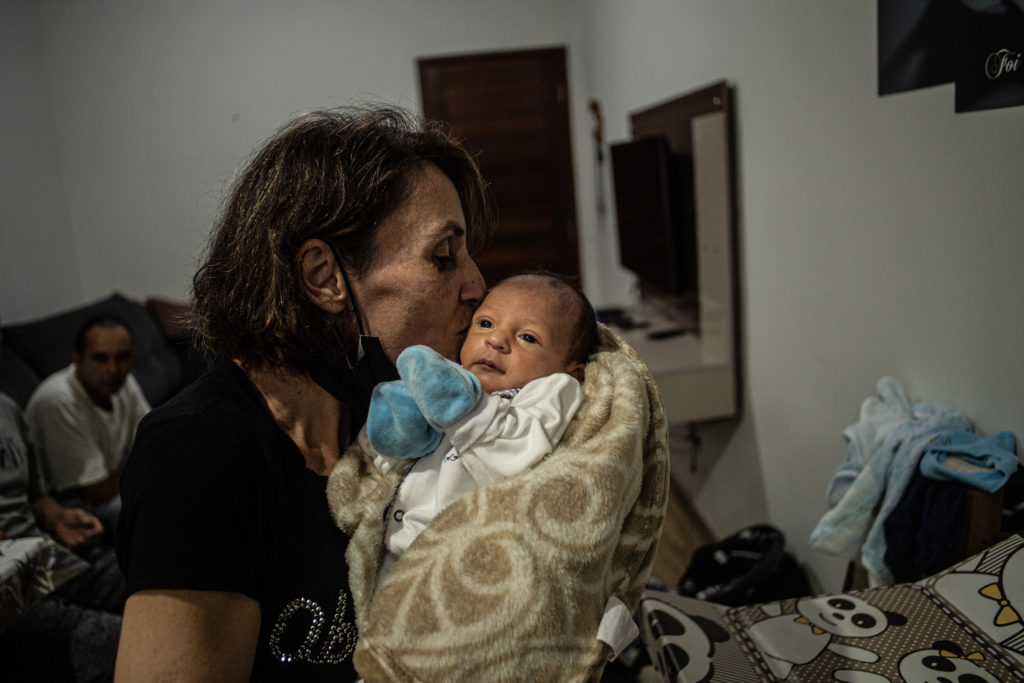
A study published in the medical journal International Journal of Gynecology and Obstetrics in June 2020, revealed that, from the beginning of the pandemic until June 18, 160 deaths of pregnant and postpartum women worldwide were reported by Covid-19, 124 of them in Brazil. These figures show that the country is responsible for 77% of the world's deaths. The paper, entitled The Covid-19 Tragedy in Brazil, brings other numbers also exposing the lack of access to assistance. In the 2021, the weekly average maternal deaths from Covid in 2021 is more than twice as high as 2020 Lack of access to the ICU and intubation affects up to a third of pregnant women and postpartum women who died during the pandemic. According to the latest update, on April 7, since the beginning of the pandemic, there were 9,479 cases of hospitalization by Covid among pregnant women and puerperal women, with 738 deaths. There are another 9,784 records of SARS (severe acute respiratory syndrome) not specified in this group, with 250 deaths. For the researchers, there is a great possibility that these cases are also Covid. In this picture: Raquel Falaguera Landegraf, 42, mother of Bianca Falaguera Landegraf, 24, with her grandson Emmanuel, born on April 24, during an emergency cesarean section. His mother, Bianca, was infected by her husband, who had contracted the disease at work but did not show any severe disease symptoms. Bianca was 34 weeks pregnant when she was hospitalized on March 22 with shortness of breath, saturating only 83%. Two days later, doctors decided that the baby's birth should be antecipated due to the mother's clinical condition. On March 24, her son Emmanoel was born after an emergency cesarean section with the mother intubated and unconscious. Bianca remained intubated until April 13 after her clinical condition improved. On April 16, she can be discharged from the intensive care department. The secretary of Primary Health Care of the Brazilian Ministry of Health, Rapha
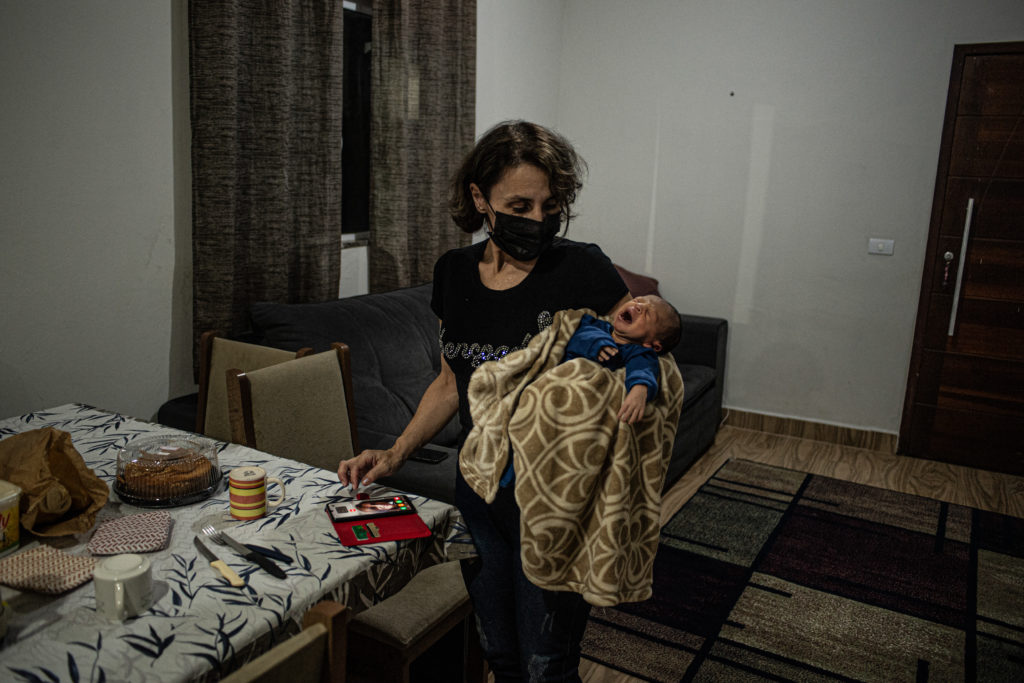
A study published in the medical journal International Journal of Gynecology and Obstetrics in June 2020, revealed that, from the beginning of the pandemic until June 18, 160 deaths of pregnant and postpartum women worldwide were reported by Covid-19, 124 of them in Brazil. These figures show that the country is responsible for 77% of the world's deaths. The paper, entitled The Covid-19 Tragedy in Brazil, brings other numbers also exposing the lack of access to assistance. In the 2021, the weekly average maternal deaths from Covid in 2021 is more than twice as high as 2020 Lack of access to the ICU and intubation affects up to a third of pregnant women and postpartum women who died during the pandemic. According to the latest update, on April 7, since the beginning of the pandemic, there were 9,479 cases of hospitalization by Covid among pregnant women and puerperal women, with 738 deaths. There are another 9,784 records of SARS (severe acute respiratory syndrome) not specified in this group, with 250 deaths. For the researchers, there is a great possibility that these cases are also Covid. In this picture: Raquel Falaguera Landegraf, 42, mother of Bianca Falaguera Landegraf, 24, with her grandson Emmanuel, born on April 24, during an emergency cesarean section. His mother, Bianca, was infected by her husband, who had contracted the disease at work but did not show any severe disease symptoms. Bianca was 34 weeks pregnant when she was hospitalized on March 22 with shortness of breath, saturating only 83%. Two days later, doctors decided that the baby's birth should be antecipated due to the mother's clinical condition. On March 24, her son Emmanoel was born after an emergency cesarean section with the mother intubated and unconscious. Bianca remained intubated until April 13 after her clinical condition improved. On April 16, she can be discharged from the intensive care department. The secretary of Primary Health Care of the Brazilian Ministry of Health, Rapha
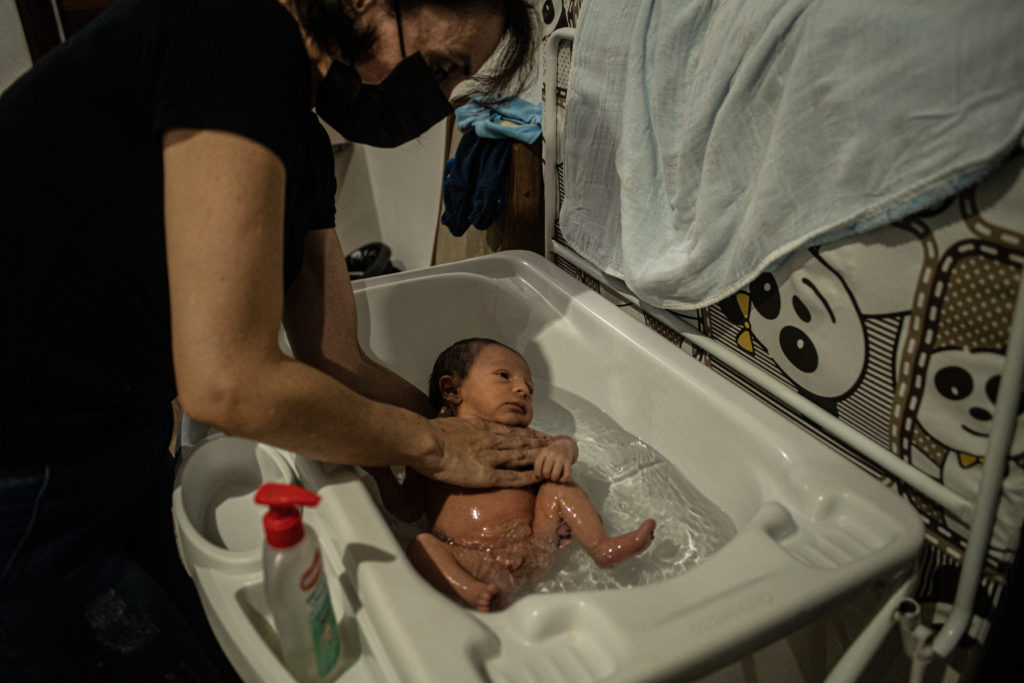
A study published in the medical journal International Journal of Gynecology and Obstetrics in June 2020, revealed that, from the beginning of the pandemic until June 18, 160 deaths of pregnant and postpartum women worldwide were reported by Covid-19, 124 of them in Brazil. These figures show that the country is responsible for 77% of the world's deaths. The paper, entitled The Covid-19 Tragedy in Brazil, brings other numbers also exposing the lack of access to assistance. In the 2021, the weekly average maternal deaths from Covid in 2021 is more than twice as high as 2020 Lack of access to the ICU and intubation affects up to a third of pregnant women and postpartum women who died during the pandemic. According to the latest update, on April 7, since the beginning of the pandemic, there were 9,479 cases of hospitalization by Covid among pregnant women and puerperal women, with 738 deaths. There are another 9,784 records of SARS (severe acute respiratory syndrome) not specified in this group, with 250 deaths. For the researchers, there is a great possibility that these cases are also Covid. In this picture: Raquel Falaguera Landegraf, 42, mother of Bianca Falaguera Landegraf, 24, with her grandson Emmanuel, born on April 24, during an emergency cesarean section. His mother, Bianca, was infected by her husband, who had contracted the disease at work but did not show any severe disease symptoms. Bianca was 34 weeks pregnant when she was hospitalized on March 22 with shortness of breath, saturating only 83%. Two days later, doctors decided that the baby's birth should be antecipated due to the mother's clinical condition. On March 24, her son Emmanoel was born after an emergency cesarean section with the mother intubated and unconscious. Bianca remained intubated until April 13 after her clinical condition improved. On April 16, she can be discharged from the intensive care department. The secretary of Primary Health Care of the Brazilian Ministry of Health, Rapha
